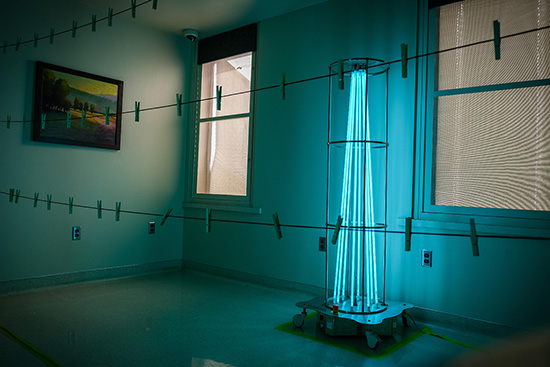
It’s no secret: Hospitals throughout the U.S. are facing a critical N95 respirator mask shortage. Instead of accepting this shortage as fact, UNMC and Nebraska Medicine experts teamed up to tackle the problem head on.
They came up with an innovative solution: Using big ultraviolet (UV) light towers to decontaminate the N95 masks, making them reusable.
John Lowe, PhD, UNMC assistant vice chancellor for Inter-professional Health Security Training and Education, led the team tasked with designing this process. Dr. Lowe worked closely with Nebraska Medicine infectious diseases experts like Mark Rupp, MD.
“The shortage of PPE is a nationwide issue – each and every one of these items is increasingly precious,” Dr. Rupp says. “Although we were well prepared, our supplies are beginning to dwindle. We had to find a way to keep our providers and patients safe, and this will definitely help us achieve that goal.”
How we disinfect N95 masks
After each use, health care workers put their masks in a paper bag.
The bag then goes to a room equipped with a UV light tower. The big tower, which gives off an eerie blue glow when turned on, normally lives in the Nebraska Biocontainment Unit. It’s used to decontaminate rooms after patients leave. The ultraviolet light disrupts the coronavirus’s genetic material, deactivating it.
In the new decontamination room, masks hang across long, thin wires, resembling a clothesline. Then the UV tower goes to work. Once it’s finished, the masks are removed, put in a fresh, clean bag, and returned to their original owners for reuse.
Why are N95 masks so important?
A normal surgical face mask is a loose fitting barrier that covers your nose and mouth. It protects against the immediate environment, but doesn’t protect health care workers from the new coronavirus.
N95 masks are custom fit to each health care worker. They have filters inside that capture at least 95% of virus particles, protecting those who are fighting on the front lines of this pandemic from an infection.


